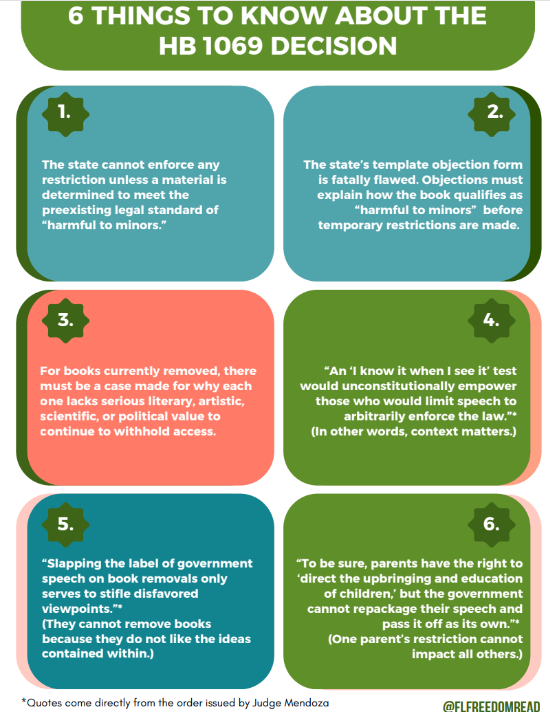Court Victory Inspires Hope But Creates No Immediate Change in Florida School Libraries
As educators and authors wait on expected appeals in Penguin Random House v. Gibson, school librarians are in limbo and author Laurie Halse Anderson is "cautiously opimistic."
The August 13 federal court ruling in Penguin Random House v. Gibson was welcome positive news for intellectual freedom advocates. The decision that Florida House Bill 1069 was "overbroad and unconstitutional" validated plaintiffs in their claim that the books removed because of the law should have remained on the shelves. Theoretically, those titles could return to the shelves with the ruling, but the court decision has not translated into change in schools yet.
“As uplifting the news of the judicial ruling on HB1069 is, nothing has changed yet,” a school librarian from Florida told SLJ. “We are still following the protocols that are in place until we see what happens next in the courts. With high hopes, we will stop living in fear of checking out books to our students and return books to our shelves again.”
 In his ruling, Judge Carlos E. Mendoza referenced the work of librarians, writing, “Historically, librarians curate their collections based on their sound discretion—not based on decrees from on high.”
In his ruling, Judge Carlos E. Mendoza referenced the work of librarians, writing, “Historically, librarians curate their collections based on their sound discretion—not based on decrees from on high.”
And he noted the issue for educators with the broad and vague nature of the law. Told to “err on the side of caution,” educators were acting preemptively and self-censoring classroom libraries and school collections.
“It’s not clear how the State expects Educational Media Specialists, educators, or other school officials to know exactly what crosses the line in the State’s eyes,” Mendoza wrote. “The vagueness of the provisions only serves to expand their sweep.”
Author Laurie Halse Anderson, who was one of the plaintiffs in the case, described her reaction to the ruling as “cautiously optimistic.”
“The state’s lawyers have already said they plan to appeal,” says Anderson.
In August 2024, Anderson joined the Big Five publishers—Penguin Random House (PRH), HarperCollins, Hachette, Macmillan, and Simon & Schuster—plus Sourcebooks; the Authors Guild; two Florida parents; and fellow authors Julia Alvarez, John Green, Jodi Picoult, and Angie Thomas in suing the Florida Board of Education and school boards in Orange and Volusia counties.
“Judge Mendoza’s ruling was a wonderful victory, but it’s only one step toward our goal of protecting the Constitution,” Anderson says. “To borrow from Robert Frost, we have miles to go before we can sleep.”
In the meantime, Florida school librarians and their fellow educators must figure out what the ruling means in practical terms. To that end, the Florida Freedom to Read Project (FFTRP) broke down the decision:
- Students have a constitutional right to read—and the state can’t block that just because someone doesn’t like a book.
- Book bans must be based on real legal standards (like the Miller test and Florida’s current definition of “harmful to minors”), not vague and subjective ideas about what’s “inappropriate.”
- Parents can guide their own children, but they can’t erase access for everyone.
- Professional librarians are trusted to make decisions, not politicians or political pressure groups.
- Florida’s HB 1069 law crossed a constitutional line by mandating removals of books that are not legally obscene.
For those who argue that removing books from schools is not censorship or book banning because the titles can be acquired elsewhere, Mendoza cited Supreme Court precedent that says access to speech cannot be denied just because it’s available somewhere else.
“One is not to have the exercise of his liberty of expression in appropriate places abridged on the plea that it may be exercised in some other place,” Mendoza wrote.
With his ruling, decisions on whether a book is appropriate for school or not will be judged with the Miller Test to determine obscenity. That Supreme Court precedent requires one to consider three questions when evaluating material: Does the work appeal to prurient interest?; does it depict or describe, in a patently offensive way, sexual conduct specifically defined by the applicable state law?; and does the work when taken as a whole lack serious literary, artistic, political, or scientific value?
The authors in the suit claimed that the removal of challenged titles violates authors’ free speech and negatively affects their livelihoods. The law doesn’t just remove books from shelves, it keeps them from being purchased by schools in the first place, and could impact authors’ opportunities and publisher decisions in the future.
“I worry deeply about the effect all of this is having on authors’ livelihoods and their creative choices,” says Anderson. “But I’m worried for everyone; readers and families deprived of books, educators and librarians whose jobs are on the line, and communities being torn apart by lies, threats, and manipulation.”
She felt a civic responsibility to join the suit.
“As an American, I feel a deep responsibility to speak up and fight back because our Constitution is under attack,” she says. “Totalitarians are terrified of free speech. They can’t destroy democracy when people have access to information and the ability to disagree with the government. We writers have the tools, the skills, and the moral obligation to fight back. These chuckleheads aren’t just stealing books. They’re erasing our history, demonizing entire populations, and burning our freedoms to ash.”
RELATED
The job outlook in 2030: Librarians will be in demand
The job outlook in 2030: Librarians will be in demand
ALREADY A SUBSCRIBER? LOG IN
We are currently offering this content for free. Sign up now to activate your personal profile, where you can save articles for future viewing






Add Comment :-
Be the first reader to comment.
Comment Policy:
Comment should not be empty !!!